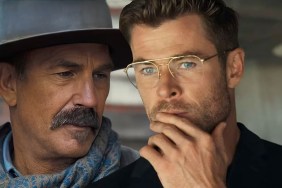Less than a year after blowing people away with his darkly humorous adaptation of Christopher Buckley’s Thank You for Smoking, director Jason Reitman has returned, gracefully side-stepping the worries of a sophomore slump by taking a different route with his second film Juno. This one isn’t an adaptation and it wasn’t even written by Reitman, despite him winning an Indie Spirit award for the Buckley adaptation earlier this year. Instead, the movie is based on the first screenplay by internet personality (and former stripper) Diablo Cody about a feisty outspoken teen, played by Ellen Page, who approaches the yuppie couple Mark and Vanessa Loring (Jason Bateman, Jennifer Garner) to adopt the baby she’s going to have after becoming pregnant from an impromptu sexual encounter with her best friend (Michael Cera of Superbad).
ComingSoon.net has an exclusive interview with this innovative director who continues to make waves with every new film.
ComingSoon.net: How did Diablo’s script come your way?
Jason Reitman: A very good friend of mine is friends with the guy who discovered her online, so he got a copy early and he gave it to me.
CS: Did you know about her book “Candy Girl” and the buzz surrounding it already?
Reitman: Never heard of it. I just got a call saying, “There’s this script you got to read. It’s a high school comedy,” and I said, “Really?” And he goes, “Yeah, but it’s really good. You have to read it today.” So the messenger arrived, I opened the script, I started reading it and I was still standing up. I was in the kitchen when I started reading it. I feel like you get that call fairly often: “This script is amazing. You have to read it,” then you read it and you go, “Oh yeah.” Sometimes, you get the scripts that are on secret spy paper that’s uncopyable and you have to sign contracts to read the screenplays. There are all sorts of stuff that happens that’s supposed to inspire excitement, but nothing’s quite as exciting as a fresh voice, and that’s what I saw on Page One and I was just like, it was instantaneous. I was like “Oh my god, this girl can write.” Then it just becomes a question of, “Well she can write, but is there a story here?” then about halfway through, by the time we got to the ultrasound scene, I was pretty confident that if I didn’t direct this movie I would regret it for the rest of my life.
CS: After “Thank You for Smoking”, I assume people were chasing you as a director and you probably were trying to stay on course to do your own thing.
Reitman: I experienced that a lot and now I’m experiencing that again. Stuff that’s kind of crazy, but it’s a lesson in patience and in discipline.
CS: How much of the detail was in the script? You must have kept that unique dialogue she came up with but what about things like the debates over Herschel Gordon Lewis, Sonic Youth, things like that? Were all those things in the script?
Reitman: Diablo Cody, she’s the real deal. She’s very inventive and that stuff was there. The script was written so fast. It was written in like seven weeks in the Starbucks section of a Target in Minneapolis. I’ve read her other stuff since. I’ve read two screenplays and a pilot of hers that she’s written since “Juno.” The pilot is being made by Spielberg. One script is at Universal, I’m making her other script. It’s all great work. This girl is the real deal.
CS: Considering how much you’ve been working with her, has her writing influenced your own writing at all?
Reitman: It’s so different from how I write that, no it doesn’t really. My writing voice is very much like “Thank You for Smoking.” It’s a guy’s voice. It’s very masculine. Not to say that her voice is very feminine, but they’re very different.
CS: How did you approach this movie as a director differently from the first movie? With the previous movie, you were obviously channeling Buckley’s book and trying to adapt that into your own voice, but here, you’re trying to capture her vision in some ways.
Reitman: There are parts of it that really spoke to my voice, and that was the kind of open-minded point of view to the subject matter that people are sensitive about. Teenage pregnancy is something that people usually dance around and Diablo just went up and said “hello” to it. She’s kind of fearless and so is Ellen Page and I dig that. That’s what excited me about “Thank You for Smoking” and that’s what I liked about this. A lot of it is just kind of remembering that feeling that I felt the first time I read it and creating that feeling in the film so people can experience what I experienced.

CS: I can’t imagine any teen girl acting or talking like Juno does, so how realistic do you think this is and does it matter to you how close something is to real life or not?
Reitman: To be honest, I thought there was a lot of reality in the film. Even though there is some heightened dialogue, Ellen Page is very much like that, I’ve met a few young people. I think Ellen is closer to Juno and Michael Cera is closer to Bleeker than they’d probably admit to.
CS: I’ve met Michael and yeah he’s very similar to his persona on-screen. Ellen is very outspoken, but I think some people see Juno as this kind of cool hero type, though I see her almost as a brat, but others argue she’s just speaking her mind.
Reitman: I think what you’re picking up on is that there are particular scenes in which Juno is in an environment that’s foreign to her. She’s a sixteen-year-old girl. For example, the Loring house, and when she’s in a situation like that, she gets a little more spunky. She starts pushing people’s buttons more. I think that comes from a very real place. It comes from a girl who’s nervous to be in that situation and because of that she kind of, you know, her feathers come up a little. I think it’s actually coming from a real place.
CS: You’ve mentioned “Citizen Ruth” as one of your influences, so how do the early movies of Alexander Payne, which deal with some of the same stuff, how did they inform you? Did you deliberately try to avoid certain things visually?
Reitman: “Citizen Ruth” is a really heightened world. I think that film had a huge influence on “Thank You for Smoking,” but it was really different from this. “Election” was closer to this as far as those Midwestern characters and exploring kind of the real sh*t that people go through. I think there’s a lot of Mark stuff that’s drawn from Matthew Broderick’s character in “Election,” the humiliation.
CS: How about “Napoleon Dynamite”? That’s another obvious comparison people make.
Reitman: Yeah, I’m really confused by that. I actually see none of “Napoleon Dynamite” in this. I really don’t understand how people…
CS: Maybe it’s the dialogue?
Reitman: When I look at Napoleon Dynamite’s style I’m reminded of how I spoke when I was an eight-year-old boy. It was just like capturing the essence of, “Duh!” It was just like the stuff that I would say when I was like eight, nine, ten years old. With this, it really articulated teen-speak well. Yet there’s a realness I think to this movie that Napoleon never had… and that’s not to say that Napoleon was looking for it. Napoleon was supposed live in a very heightened world. I know it was heightened for me and Juno’s world comes from Diablo’s childhood and the Loring neighborhood really comes from my childhood and the house I grew up in.
CS: Can you talk about the casting? I thought Jason and Jennifer were really interesting and I wanted to know how you saw them as the perfect couple. Had they already filmed “The Kingdom” at that time?
Reitman: They had done “The Kingdom.” I had really liked Jennifer for this. I met with her. She had just had a baby and we talked about the Vanessa character and she just seemed to understand it perfectly, and then she said, “You really have to meet Jason Bateman.” I was a fan of his from “Arrested Development.” We started talking about him and I realized that he was perfect. He was kind of that man-boy that Mark was, and he just had a baby too and he had just kind of grown up. He’s just really sharp. I mean, they both are. She just had an incredible amount of warmth that I thought was perfect for this movie and he just has that youthful quality to him and that biting humor and that’s great.

CS: Obviously there are no good guys or bad guys to this movie, but do some people, particularly guys, maybe see Garner’s character Vanessa as the antagonist?
Reitman: I think in the beginning you are just supposed to be like, “Wow, this guy seems like a really nice guy, but he’s got an uptight wife.” The big change is that it swaps on you. That’s one of the things I loved about the screenplay is that you have all these expectations. You also think, “Oh well, Bren is the typical stepmother,” and you don’t expect her to come to her daughter’s rescue in the ultrasound scene. Then of course with Mark and Vanessa you just think the opposite, you just think he’s a really charismatic cool guy, a guy you’d want to hang out with. And then you come to realize that he’s being disingenuous with what he’s saying and he’s really not capable of growing up and that this is a woman who is not cold, in fact and she has a lot of warmth. She just wants to have that baby and she doesn’t want to f**k it up. There’s so much tension for her that it makes her come off cold.
CS: It was nice seeing J.K. Simmons as one of the few carryovers from “Thank You for Smoking” playing Juno’s father because he doesn’t usually play that kind of role.
Reitman: Yeah, I mean he’s the guy I kind of want to put in everything I ever do. He in real life is this guy. He’s a really warm, teddy bear kind of guy who loves his two kids so much. I got to know him pretty well and we’re buddies now, and it was a joy to give him a role to be himself in. Because you’re right, he’s always barking in movies and he’s always saying things like, “Mr. President, the missiles are in the air.” He always has to say stuff like that, so the idea that he could be himself, that made me really happy.
CS: That’s pretty awesome. I wish he would’ve come to the press day. I would have loved to meet him.
Reitman: Yeah! I’m sorry that he didn’t. I think he’s out in L.A., and I think he’s doing a movie right now too.
CS: I’m amazed the abortion issue keeps being brought up even though it literally takes up like two minutes of the movie. Have you heard of this indie movie called “Bella”?
Reitman: Yeah, someone just mentioned that. It has similar themes as us right?
CS: Yeah, it was actually at Toronto last year I think and got an audience award there. I saw it and thought, “Okay this is a cute indie movie. Low budget, okay acting and writing” and then I was down South for Thanksgiving and I saw a little blurb about it having this strong pro-life message because of the way the movie turned out. Knowing that you, Diablo, and Ellen are all Pro-Choice, are you worried about your movie being taken to heart by the pro-life movement?
Reitman: I want everyone to see this movie. With “Thank You for Smoking,” the liberal side was there and the conservative side was there. I’m not really pro-choice, I’m not really pro-life, I think either of those infer that I want other people to be pro-choice or pro-life. I’m libertarian and I think people should make decisions for themselves. If you want to be pro-life god bless you. If the pro-lifers think it’s theirs and the pro-choicers think it’s theirs I think that’s fantastic. I’d much rather want that.
CS: Bring them together for a screening and a peace summit between the two camps.
Reitman: There you go. It has nothing to do with what they’re talking about.
CS: You’re involved with producing Diablo’s horror movie, “Jennifer’s Body,” so are you going to direct that as well?
Reitman: No, I’m producing a movie and as soon as this strike ends I’m going to finish writing my screenplay and go direct that. It’s a little tricky and frustrating because obviously I want to finish this screenplay and I want to go direct again, and there’s going to be another strike in the summer so it’s frustrating.
CS: You’ve mentioned that Ellen was the one who the recommended The Moldy Peaches, and you got one of them, Kimya Dawson, involved in the soundtrack. Can you talk about that and were any of those songs written specifically for the movie?
Reitman: She had written all of those songs and some of them haven’t even been heard by anyone because they are self-published. She had this great catalogue of songs that were just unused.

CS: Did Diablo have any influence on stuff like the music and did you run it by her?
Reitman: Diablo was very involved. She was on set every day. When I wanted to end the movie with that song, I called her and sent her the song and said, “Hey what do you think of this?” and she loved it.
CS: Was it strange collaborating with another writer after doing your own thing?
Reitman: No, it was delightful. I was worried about it, but it was actually wonderful. I think she comes at it with a lot of intelligence, a lot of information, and no ego, and again, she lived the Juno life growing up, I lived the Loring life growing up. So anyways, we kind of co-informed this movie. The reason why the perspective on this film is kind of nice and you never feel like it’s too much from either point of view of both sides even if you judge it equally, is because we’re coming from both sides. It’s kind of bleeding in. She and I just kind of got along. You click with people and she and I just clicked. When we had to promote (the movie) apart from each other it was sad. I call her and say, “I miss you. Why aren’t you wherever with me?” and it’s much more fun when we get to do interviews and stuff together.
CS: Actually I was going to ask if I could interview the two of you together, but then I realized that she talks as fast as I do and you’re a little more laid-back, so it might not have worked out as planned.
TO BE CONTINUED…. (in our interview with the one and only Diablo Cody!)
Juno is now playing in New York and L.A. and will open in more cities on Friday, December 12. Also, read our interview with Ellen Page.









